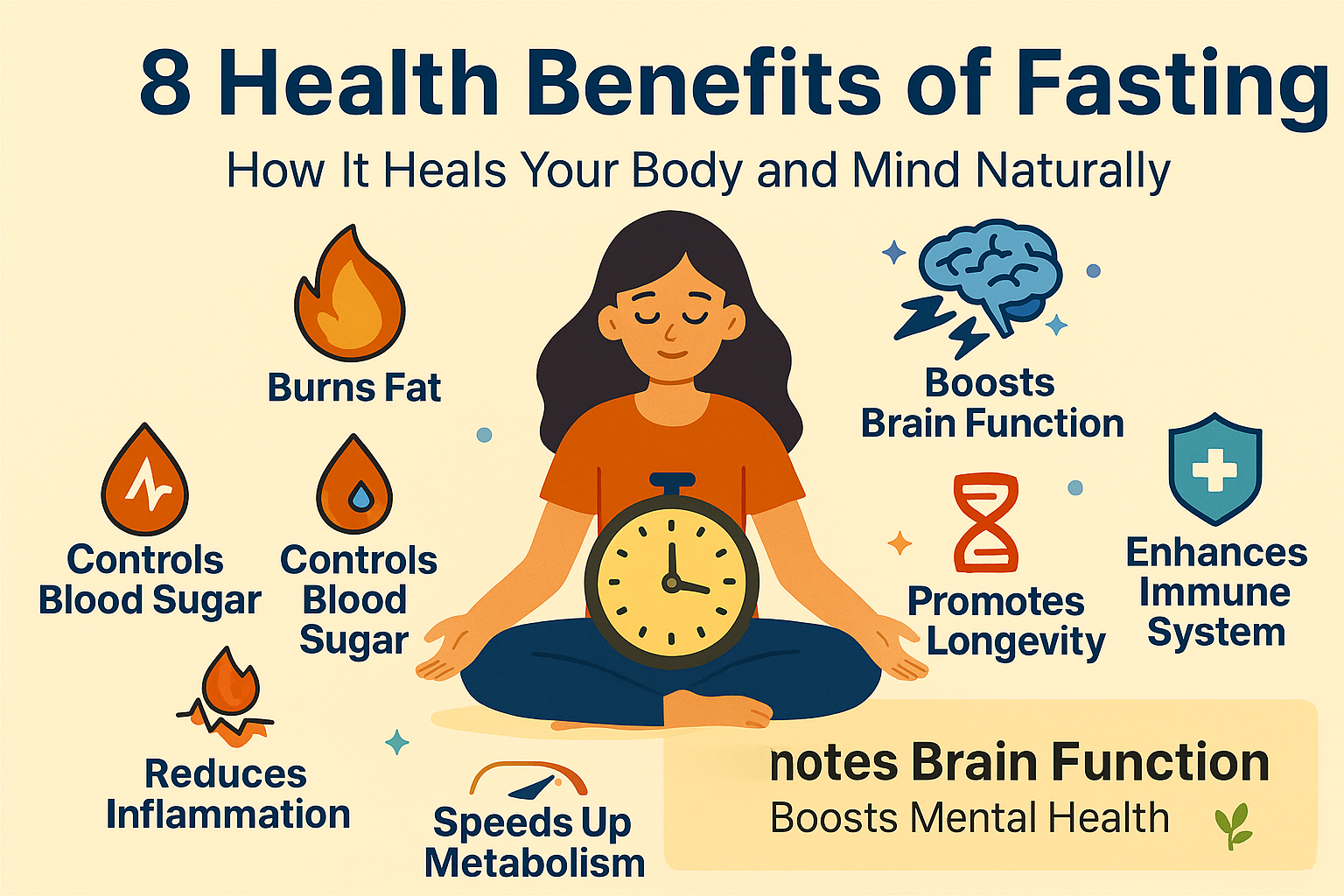Introduction: Why Everyone’s Talking About Fasting
What if skipping a few meals could help you lose weight, think better, sleep deeper, and even live longer? Sounds unbelievable—but science backs it up. Today, millions of people are turning to intermittent fasting to improve their health naturally. From celebrities to doctors, fasting is gaining fans around the world.
If you’ve ever felt tired, stressed, or out of balance, fasting may be the reset button your body needs. In this article, we’ll explore the 8 health benefits of fasting, using simple language and real science. Whether you’re curious or ready to try, this guide will show you why fasting is more than just a trend—it’s a powerful tool for better living.
🧠 What Happens to Your Body When You Fast?
Fasting is more than not eating. It’s your body’s way of healing itself. Here’s how it works:
- 0–12 hours: Your body uses stored sugar for energy.
- 12–16 hours: It begins to burn fat.
- 16+ hours: A cleanup process called autophagy kicks in—your body removes damaged cells and builds new ones.
Fasting taps into your body’s natural repair system and boosts everything from metabolism to mental clarity.
💪 1. Fasting and Weight Loss
One of the most well-known intermittent fasting benefits is weight loss. Fasting lowers insulin levels, which helps the body burn fat instead of storing it. You also naturally eat fewer calories when your eating window is shorter.
Benefits:
- Promotes fat loss
- Maintains muscle mass
- Supports long-term weight control
Tip: Try the 16:8 method—eat during an 8-hour window and fast for 16 hours.
❤️ 2. Fasting for Heart Health
Your heart loves fasting. Research shows it can improve several markers linked to heart disease.
Benefits:
- Lowers blood pressure
- Reduces bad cholesterol (LDL)
- Decreases inflammation in the arteries
Combine fasting with a heart-smart diet for even better results.
🩸 3. Fasting and Blood Sugar Control
Fasting gives your blood sugar levels a break. This can be especially helpful for people with insulin resistance or those trying to prevent type 2 diabetes.
Benefits:
- Lowers fasting blood sugar
- Increases insulin sensitivity
- Reduces the risk of diabetes
Tip: Monitor your energy levels and avoid sugary foods when you break your fast.
🔥 4. Fasting and Inflammation Reduction
Chronic inflammation is linked to many health problems like arthritis, cancer, and heart disease. Fasting can help lower inflammation markers in the body.
Benefits:
- Reduces joint pain
- Calms the immune system
- Supports overall healing
Fasting allows your body to focus on repairing instead of digesting all day long.
🧠 5. Fasting and Brain Function
Want sharper focus and better memory? Fasting stimulates brain-protecting hormones and may help build new brain cells.
Benefits:
- Increases mental clarity
- Boosts learning and memory
- Protects against age-related decline
It also boosts a protein called BDNF, which supports brain growth and function.
⏳ 6. Fasting and Longevity
Studies on animals show that fasting can extend lifespan—and the benefits may apply to humans, too.
Benefits:
- Slows aging at the cellular level
- Reduces risk of age-related diseases
- Supports long-term health and vitality
Regular fasting encourages your body to clean house, which may help you live longer and stronger.
⚡ 7. Fasting and Metabolism
A sluggish metabolism can lead to weight gain, fatigue, and brain fog. Fasting can reboot your system and help your body use energy more efficiently.
Benefits:
- Boosts fat-burning hormones
- Improves energy usage
- Supports balanced appetite
Tip: Stay hydrated and get light movement during fasts to enhance results.
🔬 8. Fasting and Immune System
Fasting supports your immune system by allowing your body to focus on repair and renewal.
Benefits:
- Regenerates white blood cells
- Strengthens your defense against illness
- Helps your body recover faster
Tip: Pair fasting with nutrient-rich foods like greens, berries, and fermented foods for immune health.
🥗 What to Eat After Fasting
How you break your fast matters. Choose nourishing, whole foods that are easy to digest.
Eat:
- Fruits like berries or bananas
- Protein like eggs or lean meats
- Healthy fats like avocado or olive oil
- Leafy greens and colorful vegetables
Healthy Foods High in Antioxidants
Avoid:
- Sugary drinks
- Deep-fried foods
- Heavy desserts
⏱️ Fasting Methods to Get Started
| Fasting Type | How It Works | Great For |
|---|---|---|
| 16:8 | Eat for 8 hrs, fast for 16 | Beginners |
| 5:2 | Normal eating 5 days, 2 low-cal days | Busy people |
| OMAD | One meal a day | Experienced fasters |
| Alternate Day | Fast every other day | Weight and sugar control |
Start slow—try a 12-hour fast and work your way up.
⚠️ Who Should Avoid Fasting?
While fasting has many benefits, it’s not for everyone.
Avoid fasting if you:
- Are under 13
- Are pregnant or nursing
- Have diabetes or low blood pressure
- Have a history of eating disorders
Talk to a healthcare professional before making changes.
💡 Final Thoughts: Fasting as a Natural Reset
The 8 health benefits of fasting are backed by science and easy to experience. From weight loss to better brain health, fasting offers a natural and powerful way to improve your body and mind.
You don’t have to go all-in. Start small. Skip late-night snacks or eat in an 8-hour window. Listen to your body and enjoy the process.
Your body knows how to heal—it just needs the space to do it.
Read more about: Mediterranean Diet 101: A Meal Plan and Beginner’s Guide
Benefits of Drinking Enough Water 7 Science-Based Health
Habits to Prevent Dementia
Harvard Health – Intermittent Fasting: What is it?
Mayo Clinic – Intermittent Fasting Diet
Cleveland Clinic – Fasting
NIH Study – Autophagy & Cell Renewal

